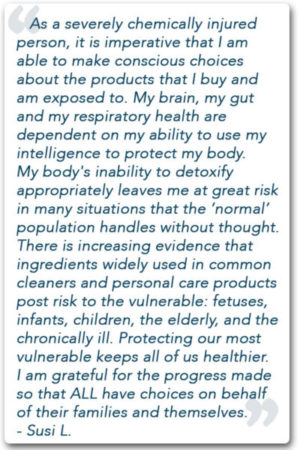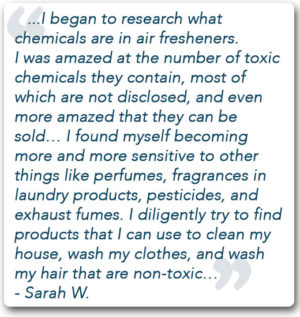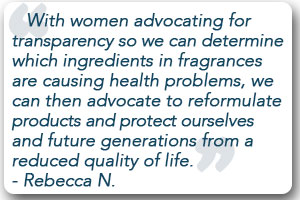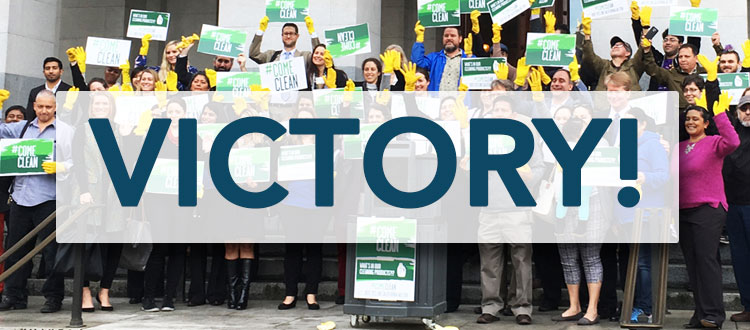VICTORY! Cleaning Product Ingredient Disclosure Becomes Law in California
 |
| Jamie McConnell Director of Programs & Policy |
Historic legislation was just signed into law in California that requires disclosure of ingredients used in institutional and household cleaning products. California Senate Bill SB 258, authored by Senator Lara and sponsored by Women’s Voices for the Earth, Breast Cancer Prevention Partners (BCPP), Natural Resources Defense Council (NRDC), and Environmental Working Group (EWG), is the first law in the nation to require disclosure of ingredients directly on the label AND disclosure of fragrance ingredients.
This is a huge victory for our right to know that we have been working toward for over a decade and is the direct result of women raising their voices.
Ten years ago companies scoffed at us when we asked them to disclose ingredients and said it just wasn’t possible. Fast forward ten years and these same companies were at the table with us and our partners, hammering out a compromise that would eventually pass both houses in the California Legislature and receive the governor’s signature.
And Californians won’t be the only ones to benefit. As a powerful market force, what’s required in California will move companies toward similar disclosure practices throughout the nation.
Finding a Compromise
But make no mistake, it was a long road that led to us coming to the table to find a compromise on SB 258 that both industry and NGO’s felt good about. Over the years thousands of women have held green cleaning parties as a form of protest for our right to know. And thousands more have emailed, called, and participated in other actions to demand companies come clean about what ingredients they are using in their products.
As a result, what was once a novel idea adopted by some forward-thinking companies like Seventh Generation and The Honest Company, became mainstream, as SC Johnson & Son, RB, Procter & Gamble, and Clorox announced new ingredient disclosure policies to give us more information about allergens and other ingredients found in their products.
Groundbreaking Law
Which leads us to this moment and this groundbreaking law. The pressure on companies over the years to reveal more about what they are exposing their customers to helped get them to the table to sit down with Women’s Voices for the Earth and our NGO partners to find a solution we all felt good about.
 As a result, what we ended up with is a law that requires the following for both household products you’d find on store shelves and institutional cleaners that are used to clean commercial and institutional spaces (I really went into the nitty gritty here for you policy wonks):
As a result, what we ended up with is a law that requires the following for both household products you’d find on store shelves and institutional cleaners that are used to clean commercial and institutional spaces (I really went into the nitty gritty here for you policy wonks):
- All intentionally added ingredients must be disclosed on the product label (starting in 2021)
- The label has to indicate whether there are allergens present in the product (either by listing the EU allergens or with a statement that the product contains allergens).
- Intentionally added ingredients, and fragrance ingredients above 100ppm, must be disclosed online (starting in 2020).
- 34 of the worst hazardous contaminants including 1-4 dioxane, chloroform, formaldehyde, and benzene must be disclosed online(starting in 2020 and down to 100 ppm).
- Disclosure of 1-4 dioxane down to 10 ppm.
- Companies have a five year grace period before they have to start disclosing CA Prop 65 chemicals.
- Online disclosure of the Chemical Abstract Service # (CAS #).
- Online disclosure of the function of the ingredient (so whether it is a preservative, or surfactant, etc.)
- Companies must adhere to a strict naming hierarchy for disclosure (Consumer Specialty Products Association Consumer Product Ingredients Dictionary (CSPA Dictionary) or International Nomenclature of Cosmetic Ingredients (INCI), followed by the International Union of Pure and Applied Chemistry nomenclature (IUPAC), the Chemical Abstract Index name, the common chemical name.
- Downloadable Safety Data Sheet with GHS pictograms for all products, not just institutional products.
- Online disclosure of ingredients in disinfectants (there are some preemption issues so on label ingredient disclosure wasn’t possible).
- Companies cannot claim trade secrets or confidential business information (CBI) for any chemical that is on the California Department of Toxic Substances Control Candidate Chemicals list.
- For all CBI claims companies are required to keep justification and available for audit by CA Attorney General
 As someone who has worked on this issue for 10 years, I am deeply proud of what we were able to accomplish with our partners, BCPP, NRDC, and EWG. Although we didn’t get everything we wanted, I believe the ingredient information that will be disclosed will go a long way to give the public the information we need to know to avoid harmful chemicals. That doesn’t mean the issue of disclosure is a done deal. We still need to push companies to disclose more, beyond what’s required by this law, and create policies and practices that ensure toxic chemicals are not used in cleaning products.
As someone who has worked on this issue for 10 years, I am deeply proud of what we were able to accomplish with our partners, BCPP, NRDC, and EWG. Although we didn’t get everything we wanted, I believe the ingredient information that will be disclosed will go a long way to give the public the information we need to know to avoid harmful chemicals. That doesn’t mean the issue of disclosure is a done deal. We still need to push companies to disclose more, beyond what’s required by this law, and create policies and practices that ensure toxic chemicals are not used in cleaning products.
For more information on cleaning products and your health, please check out our fact sheet.



